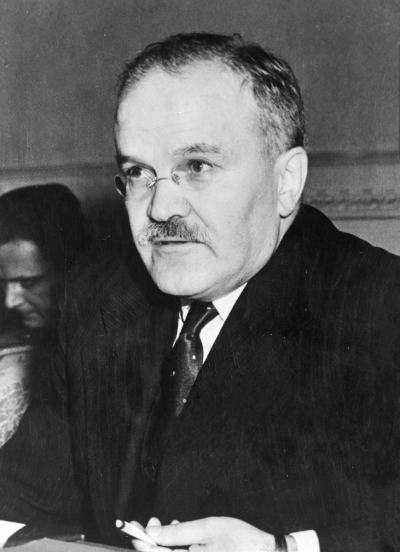GermanSoviet Axis talks occurred in October and November 1940 concerning the Soviet Union's potential entry as a fourth Axis Power during World War II. The negotiations, which occurred during the era of the MolotovRibbentrop Pact, included a two-day conference in Berlin between Soviet Foreign Minister Vyacheslav Molotov and Adolf Hitler and German Foreign Minister Joachim von Ribbentrop. The talks were followed by both countries trading written proposed agreements.
After two days of negotiations from 12 to 14 November 1940, Germany presented the Soviets with a draft written Axis pact agreement that defined the world spheres of influence of the four proposed Axis powers (Germany, Italy, Japan and the Soviet Union). Hitler, Ribbentrop and Molotov tried to set German and Soviet spheres of influence. Hitler encouraged Molotov to look south to Iran and eventually India, to preserve German access to Finland's resources and to remove Soviet influence in the Balkans.Molotov remained firm and sought to remove German troops from Finland and gain a warm water port in the Baltic. Soviet foreign policy calculations were predicated by the idea that the war would be a long-term struggle and so German claims that the United Kingdom would be defeated swiftly were treated with skepticism. In addition, Stalin sought to remain influential in Bulgaria and Yugoslavia. Those factors resulted in Molotov taking a firm line.According to a study by Alexander Nekrich, on 25 November 1940, the Soviets presented a Stalin-drafted written counterproposal accepting the four power pact but including Soviet rights to Bulgaria and a world sphere of influence, to be centred on the area around Iraq and Iran. Germany did not respond and left the negotiations unresolved.
Regarding the counterproposal, Hitler remarked to his top military chiefs that Stalin "demands more and more", "he's a cold-blooded blackmailer" and "a German victory has become unbearable for Russia" so that "she must be brought to her knees as soon as possible." Germany ended the MolotovRibbentrop Pact in June 1941 by invading the Soviet Union.
In the following years, the Soviet Information Bureau, published a book titled "Falsifiers of History", largely edited by Stalin himself, in which the Soviet premier claims that he was simply testing his enemy. This became the official version that persisted in Soviet historiography, up until the dissolution of the Soviet Union in 1991.
Vyacheslav Mikhaylovich Molotov (; né Skryabin; (OS 25 February) 9 March 1890 – 8 November 1986) was a Russian politician and diplomat, an Old Bolshevik, and a leading figure in the Soviet government from the 1920s onward. He served as Chairman of the Council of People's Commissars from 1930 to 1941 and as Minister of Foreign Affairs from 1939 to 1949 and from 1953 to 1956.
During the 1930s, he ranked second in the Soviet leadership, after Joseph Stalin, whom he supported loyally for over 30 years, and whose reputation he continued to defend after Stalin's death, having himself been deeply implicated in the worst atrocities of the Stalin years – the forced collectivisation of agriculture in the early 1930s, and the Great Purge, during which he signed 373 lists of people condemned to execution.
As People's Commissar for Foreign Affairs in August 1939, Molotov became the principal Soviet signatory of the German–Soviet non-aggression pact, also known as the Molotov–Ribbentrop Pact. He retained his place as a leading Soviet diplomat and politician until March 1949, when he fell out of Stalin's favour and lost the foreign affairs ministry leadership to Andrei Vyshinsky. Molotov's relationship with Stalin deteriorated further, and Stalin criticised Molotov in a speech to the 19th Party Congress.
Molotov was reappointed Minister of Foreign Affairs after Stalin's death in 1953 but staunchly opposed Nikita Khrushchev's de-Stalinization policy, which resulted in his eventual dismissal from all positions and expulsion from the party in 1961. Molotov defended Stalin's policies and legacy until his death in 1986 and harshly criticised Stalin's successors, especially Khrushchev.
The improvised incendiary weapon known as the Molotov cocktail is named after him.

1940Nov, 12
World War II: Soviet Foreign Minister Vyacheslav Molotov arrives in Berlin to discuss the possibility of the Soviet Union joining the Axis Powers.
Choose Another Date
Events on 1940
- 17May
Brussels
World War II: Germany occupies Brussels, Belgium. - 12Jun
Erwin Rommel
World War II: Thirteen thousand British and French troops surrender to Major General Erwin Rommel at Saint-Valery-en-Caux. - 5Jul
Vichy France
World War II: The United Kingdom and the Vichy France government break off diplomatic relations. - 10Jul
Vichy France
World War II: The Vichy government is established in France. - 11Jul
Vichy France
World War II: Vichy France regime is formally established. Philippe Pétain becomes Prime Minister of France.

 English
English  español
español  français
français  português
português  русский
русский  العربية
العربية  简体中文
简体中文 